Gender Is My Agenda Campaign
GIMAC
By Madam Bineta Diop And Dr. Thelma Awori
About The Authors Buy Now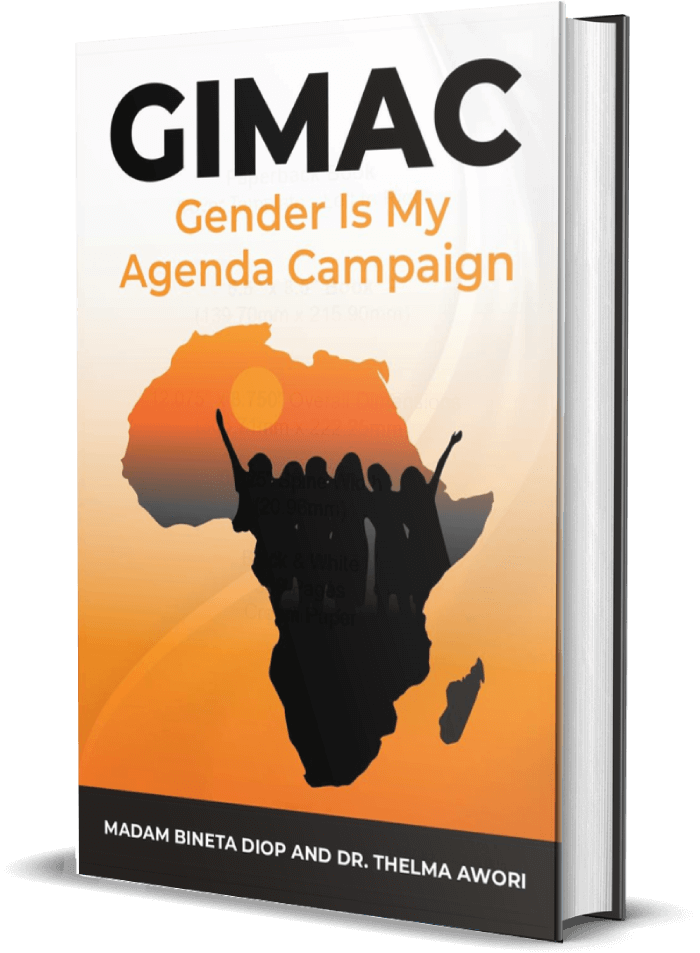

IN WRITING THIS BOOK, we depart from the oral tradition of passing on women’s herstory. While trying to record work with which we have engaged intimately, we found that there is so much with which other women have been engaged that makes up the context and foundation of the substance of this book.
The GIMAC story is thus a continuation of what others have done and upon which we have built. More importantly, the GIMAC story is a story of how we came together to make a major impact in positioning women at the policy table and operations of the African Union. It is also a story of how we prevailed on member states to commit to reporting to one another on how well their countries are doing in their efforts towards gender equality.
Dr. Thelma Awori worked closely with Bineta Diop, which formed between them a strong bond of sisterhood and support. She is an educator and a strong advocate for the rights of women. Dr. Awori was highly influenced by the leadership of women around her during her formative years, whether in her village, in the administration of government, in civil society, or in religious institutions in her native Liberia during the 1950s and 1960s.
We decided to write this book because the achievements are truly impressive and a testimony to what women can achieve when they work together. The leadership for getting this done can be attributed primarily to Madam Bineta Diop, a woman whose image is larger than that of the Pharaohs. Her determination, beginning in childhood, was to remove the pain, injustice, and indignity to which women of Africa are constantly subjected.
In Chapter One, the story of how Bineta was brought up by a feminist mother who became her role model is told. Her journey brought her to visit many other continents, where she saw other realities and gained tremendous experiences from the field. She had the opportunity to be mentored by eminent people of value and integrity, who fought for respect of fundamental human rights and rule of law.
As her professional life progressed, she realized that the struggle for justice was one that each person has a responsibility to achieve. The impact of violent conflict and war on women and children and the stories shared by victims of atrocities during many conferences motivated her further to fight for the protection of women’s rights. She saw how this work was being done through international organizations, and she determined to replicate the same in Africa. After founding an organization called Femmes Africa Soidarité (FAS), she used it to enlarge the space for high-level advocacy by and for women in the African Union. All of that led to the establishment of the GIMAC.
In this chapter, we continue to discover that by the time Dr. Awori met Bineta Diop, she was already highly experienced in working on women’s issues internationally, with the churches, and with the United Nations. Therefore, given their common passion for seeking justice for women, the two formed a symbiotic relationship for working on many of the injustices that women experience. Thelma Awori is the lead founder of the Institute for Social Transformation in Uganda, which focuses on women’s economic empowerment and the creation of critical consciousness among the disadvantaged.
Chapter Three identifies the strategies GIMAC uses to encourage the implementation of policies. Lack of implementation is one of the worst challenges of policymaking. The world over seeks to bridge the gap between policymaking and implementation. GIMAC was challenged to find creative ways to ensure the implementation of the policies it has influenced on gender equality.
The African Union clearly surpasses other regional organizations in the world in terms of its progressive policies on gender justice. These policies, of course, were promoted by justice-loving citizens, especially women. It, therefore, becomes the responsibility of these citizens to ensure the implementation of the policies by holding their governments accountable. Governments need prompting and prodding, monitoring, and comparisons with one another in order to ensure the implementation of policies. In Chapter Three, the details of some of these strategies are described.
Chapter Six focuses on working with women leaders to promote leadership in accelerating the achievements of gender equality and developing women’s leadership. This chapter recognizes the great milestones achieved by Her Excellency Dr. Nkososana Dlamini Zuma in promoting a restructuring in the AU to make it a more people-centered organization. Dr. Zuma’s legacy is marked by the work she did to guide the process of instituting the parity principle in the AU, even in her position as Foreign Minister of South Africa. She can be credited with implementing the Heads of State decision to appoint a Special Envoy for Women Peace and Security and for taking a decision to appoint a Youth Envoy. Excellency Moussa Faki Mahamat appointed the first AU Envoy for Youth.
Her consultative style of leadership brought about the transformation of the narrative in the AU as being more than the dialogue between heads of state but also inclusive of the voices of women and youth. Her flagship programs showed her zeal for implementation and her courage to revisit the foundational goals of the AU for self-reliance in promoting the idea of domestic resource mobilization. She left the AU with a major agenda to be completed in 2063 for the benefit of the citizens of Africa.
Chapter Nine positions the GIMAC story in the continuum of the long history of women’s activism for justice in their societies. It argues that, despite the injustices African women have experienced, they have always taken action to defend, transform, and reshape their societies when threatened by internal and external threats. However, the advent of colonialism brought on a serious lack of understanding and therefore a misrepresentation of the status of women in African societies. Under these circumstances, colonialists attempted to restructure African society in their own image, ascribing to women an inferior position and status to men, while at the same time removing men from their sphere of operation in the home and community to labour for unjust wages on commercial enterprises owned by the colonial state and its enterprises.
This chapter gives many examples of the activism of women and their contribution to the transformation towards greater social justice during various periods in African history. It belies the narrative of the African woman as voiceless, oppressed, dominated, powerless, passive, and downtrodden. It reveals the kind of leadership of women in all sectors when the wellbeing of their society is threatened.
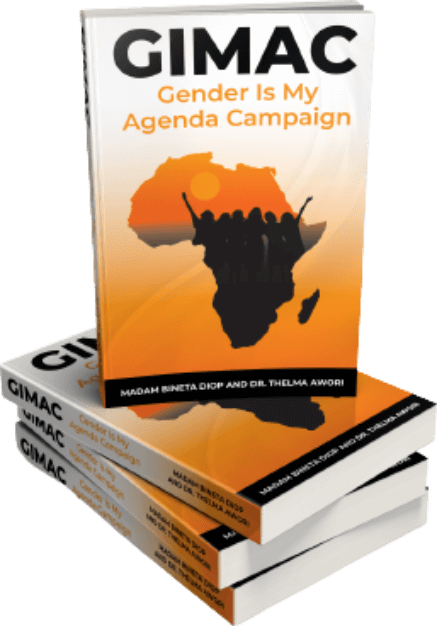
Paperback $19.95
Buy Paperback Edition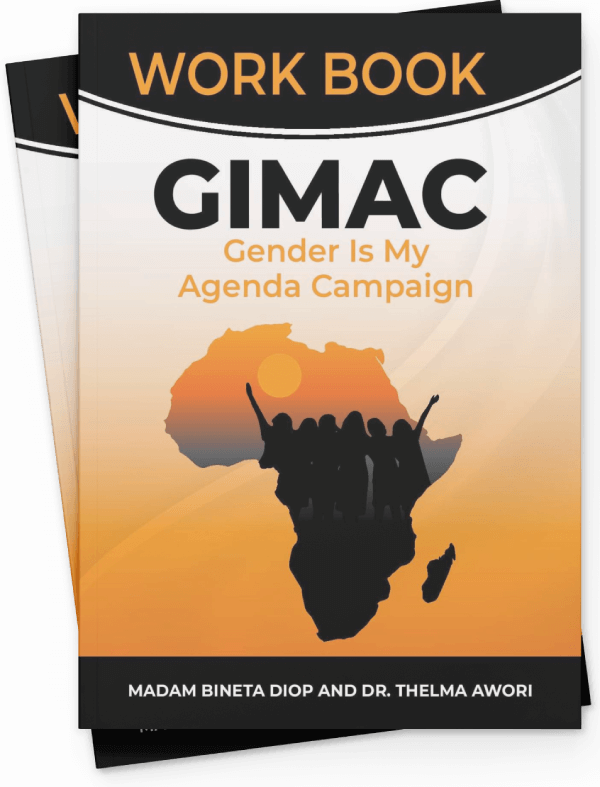
Workbook $99.95
Buy Workbook Edition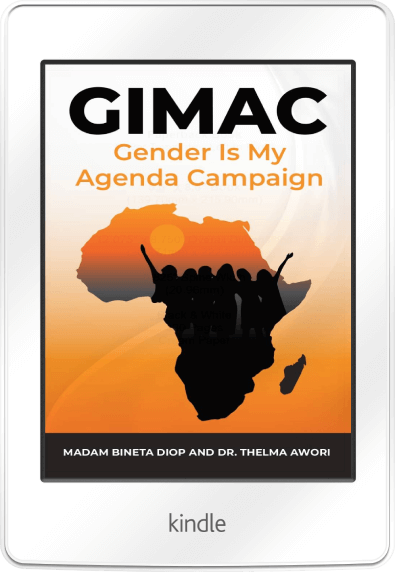
Kindle $9.83
Buy Kindle Edition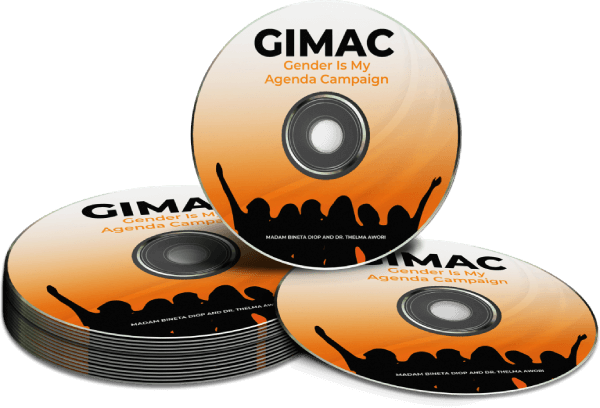
Audiobook $29.95
Buy Audiobook EditionGender mainstreaming is a strategy that aims to achieve gender equality through the integration of a gender perspective into all stages of the policy or development process (planning, design, implementation, monitoring, and evaluation); also via regulatory measures and spending programs. To do so, most IOs, states, and institutions have established specific structures and appointed a focal point, wherein, as a transversal issue, gender mainstreaming has to be the responsibility of all bodies at all levels, with the main responsibility allocated to the leadership.
As a leader, you will learn that leadership by national machinery and adequate data are important elements in gender mainstreaming strategies. Gaps in these areas hinder progress in the implementation of global commitments on gender equality” (Martin González, 2013).
The GIMAC focuses on working with women leaders to promote leadership and develop women leaders.
GIMAC is a powerful informal mechanism of collaboration between more than fifty-five organisations across Africa, all working on the same objective of gender equality and women’s empowerment.
We hope you will find inspiration and strategies that will guide you as you face the hegemony of patriarchy and injustice.
To inquire about a speaking engagement or any other information, Please fill out this form.